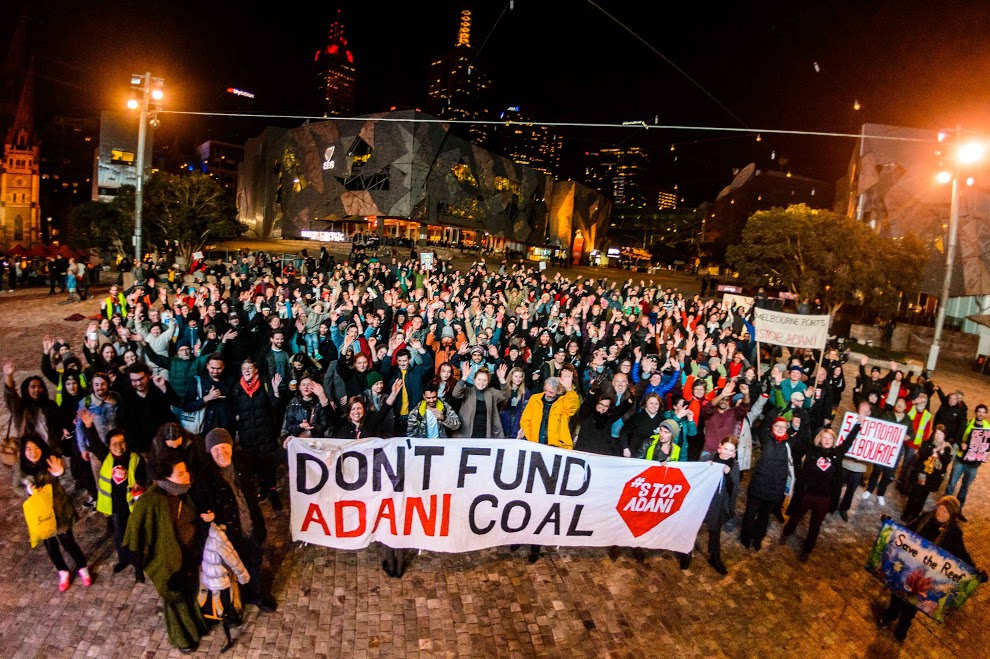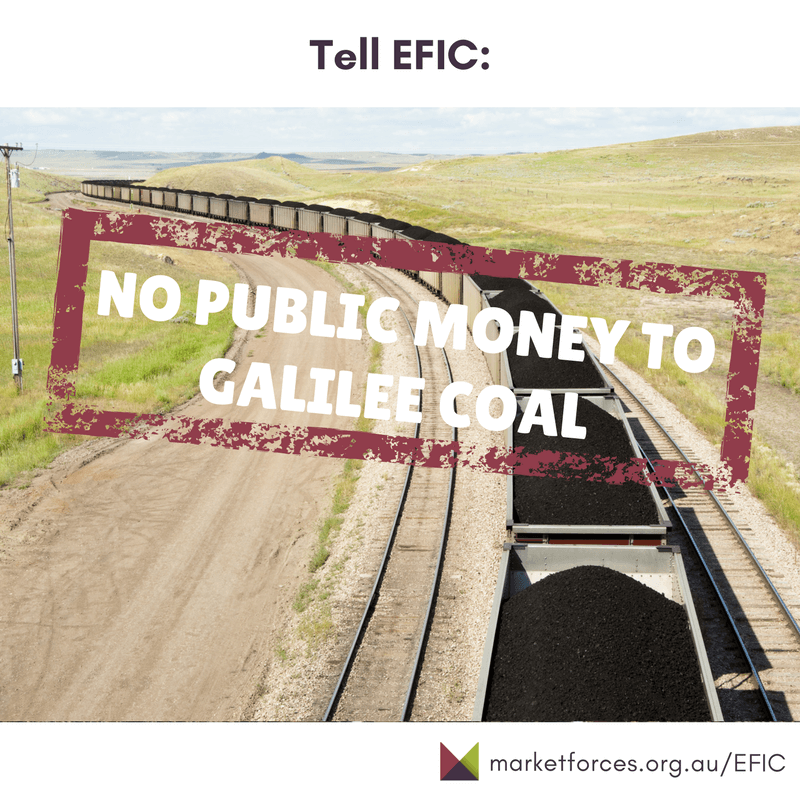UPDATE: 18 July 2018
In a television interview overnight, the son of Gautam Adani, Karan, claimed that financial close had been reached for the Carmichael coal mine. We need to treat this information carefully. On one hand, it was part of an interview containing several other inaccuracies about the status of the Carmichael mine's approvals, and the cost of the proposed rail line. There has also been no reporting on this "news" using any other source than the Karan Adani interview, who is involved with the company through its ports business in India.
However, dismissing the news is also not an option. It is possible that the Adani family could have agreed to finance the mine using its own money and this could take place outside of the public spotlight. This would be a last-resort option though, and still would not solve the problem of having no contractor to build the mine and no finance for the rail line that would need to be built to take coal from Carmichael to Abbot Point.
What remains clear is that Adani has been unable to tap the private finance market for capital for their environmentally disastrous mega coal mine. Still, the biggest supporter of the Carmichael coal project is the Australian Government, which has repeatedly attempted to use public money to prop up Adani's unpopular proposal. If this project is going to proceed, it is highly likely that Australian taxpayers' money would make it happen. Take action to stop public money going into Adani's mega mine here.

Adani has gone relatively quiet recently about their central Queensland Carmichael coal mine and rail project. With no financiers, no major customers and continued opposition by community and traditional owners, the Carmichael project is looking more unlikely now than it ever has in the past eight years.
Yet some avenues remain open for Adani to find the money to build the mine and railway line. Here we take a look at where Adani is at right now and how it could still get the project off the ground.
Hot off the press: summary on where Adani is at regarding financing for its Carmichael #coal mine and rail project.
— Market Forces (@market_forces) July 9, 2018
The good news is it's looking unlikely that Adani can get their mine off the ground. However, the fight still isn't over.#StopAdanihttps://t.co/dAA5aeVRUx
2017 ends badly for Adani
Adani’s cancellation of the “official launch” of the Carmichael mine project in October 2017 due to “rain” (it was never rescheduled), set the tone for the last two months of 2017, which brought an avalanche of bad news for Adani.
Bowing to public pressure, Qld Premier Palaszczuk vetoed the proposed taxpayer-funded loan to Adani that was to be provided through the Northern Australia Infrastructure Facility (NAIF). Then, in early December, four large Chinese banks ruled out lending to Adani. The Chinese embassy in Australia also declared that Chinese money would not fund the Carmichael mine. This cut off the last obvious source of capital for Adani and brought the total to 28 major banks that won’t touch the project.
One week before Christmas 2017, Adani’s mine construction partner, Downer, cancelled their non-binding agreement, walking away from the project. While Adani tried to spin Downer’s actions as a decision it took to bring the mine construction in-house, the Australian Financial Review reported that Downer had requested the cancellation. Adani was now without funders or an experienced mining services partner.
Against this backdrop, it was no surprise that Adani missed the latest of its deadlines to reach financial close on 31 March 2018. It has refused to set a new deadline.
Despite these setbacks Adani claims to be “100% committed” to the Carmichael coal project, and while developments appear to have slowed in 2018, there are a few key areas to watch.
Areas to watch
1. Export Finance and Insurance Corporation (Efic) keeps taxpayer funding option open
Efic is a Federal Government body that finances Australian companies which export or wish to export. In 2012, the Productivity Commission recommended Efic stop supporting large corporations. As a result, the Abbott Government Trade Minister Andrew Robb changed Efic’s rules so it could no longer finance onshore mining projects.
This new rule was removed by Turnbull Government Trade Minister Steven Ciobo in September 2017. He claimed it was because major banks and other private financiers were unwilling to fund coal due to public opposition to these projects.
This rule change had the intended effect of opening up another avenue for taxpayer funding of the Carmichael project. Efic later revealed they had considered financing three separate Adani suppliers, and that one had been approved, although that deal later fell through.
Efic testified in Senate Estimates on 1 June 2018 that it is not currently considering any applications from Adani or Adani suppliers. This is good news. However, Efic remains a potential financier of the Adani coal mine.
2. Adani refinances Abbot Point coal port debt while trying to sell some of it
Another potential source of funds for Adani’s Carmichael project is to sell down its stake in the proposed mine and/or the Abbot Point coal port, which Adani has owned since 2011.
Reports from 2014 and 2016 show that Adani has been unsuccessfully trying to sell a stake in the port for years. In 2018 they appointed investment bank Rothschild to advise on the sale. Adani’s inability to find a buyer could be linked to the gloomy economic outlook for Abbot Point port, with the amount of coal contracted to be shipped via take-or-pay contracts predicted to fall rapidly from 2020.
While Adani hasn’t yet found anyone foolish enough to buy a stake in Abbot Point, it has been successful in refinancing part of the debt linked to its purchase.
Adani owes around $2 billion with a large tranche of this due to mature in November 2018. After a desperate almost year-long search Korean asset manager Mirae Asset Daewoo bought $330 million worth of debt, with the aim of on-selling it to Korean insurance companies and other investors.
Take action: Warn Korean investors that buying Adani’s Abbot Point debt is a big risk
While the refinancing does shore up Adani’s financial position with Abbot Point, the fact that it took 11 months to finalise and failed to attract any top-tier (or even mid-tier) banks says a lot about how toxic Adani and their Australian coal export plans have become.
3. Adani still looking for potential markets
Despite working on the Adani Carmichael project for around eight years, Adani still doesn’t have any confirmed major customers for the coal it intends to dig up. It’s even had help from the Australian Government, which brought an Adani representative along as part of a trade delegation to Vietnam in May 2018.
The coal plant that was supposed to be a major customer, the massive (~4000MW) Mundra power station in India, has had most of its generating units switched off, with the Adani subsidiary that owns the plant considering declaring bankruptcy. Mundra’s reliance on relatively expensive imported coal meant it was running at a loss. Adani is also looking to build the 1600MW Godda power station, which will sell expensive electricity to Bangladesh. Adani Australia's CEO said in March 2018 that the coal for this power station would come from Carmichael despite the plant being in India's most coal-rich state. Construction has yet to begin for this project, with Adani facing fierce resistance from local landholders whose lands are being compulsorily acquired. Godda power station could end up as a destination for some of Adani's Australian coal, but the project remains speculative.
So, Adani’s plans to get the Carmichael coal project off the ground appear more fanciful than ever. After years of trying Adani still doesn’t have financial partners to fund the project or customers for their coal. It has been unable to sell a stake in its Abbot Point coal port and had to scrape the bottom of the barrel to refinance its debt.
Some of Adani’s political backers are also losing patience. It still faces strong resistance to its plans from the Wangan and Jagalingou traditional owners who have refused to give their consent. Adani’s trouble with the Carmichael project is now impacting upon the rest of its business too, with institutional investors abandoning the company.
However, the situation could quickly change. Adani still has a means for accessing Australian taxpayer funds via Efic, and strong support from major political parties in India and Australia. The most recent example is the supposedly "free market" LNP party in Queensland voting in July 2018 for the Australian Government to build and run the railway line between the Galilee coal basin (where Carmichael would be) and the Abbot Point port in the Great Barrier Reef World Heritage Area (this motion is not binding on the LNP parliamentary wing). While it’s hard to imagine any company or individual being foolish enough to risk their money on the Carmichael project, until the project is stopped by an act of government or by Adani finally abandoning it, the fight against it will continue.

